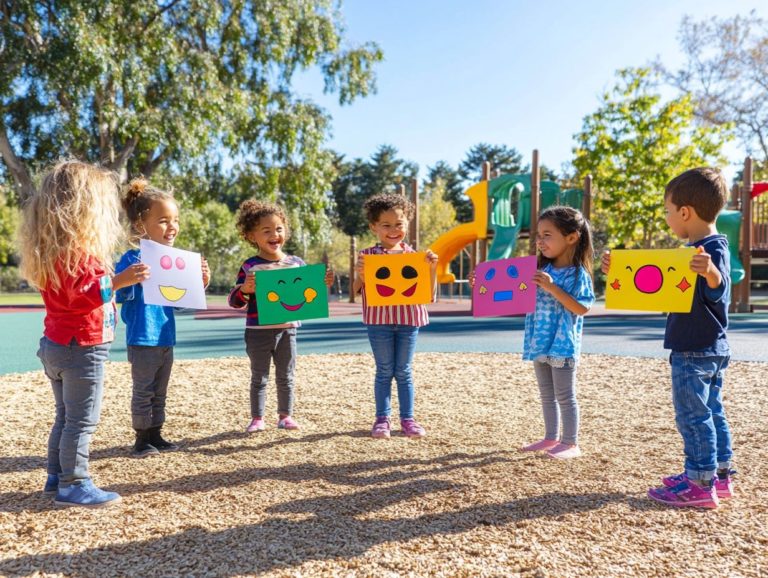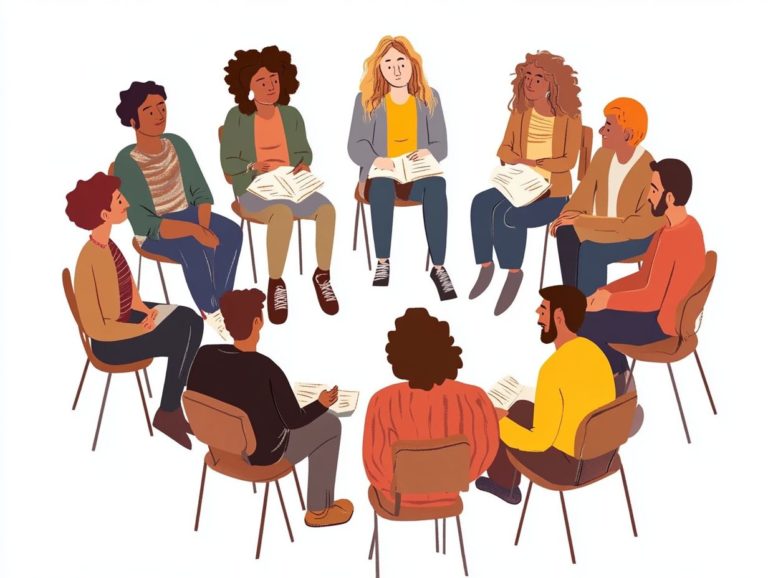The Role of Empathy in Emotional Awareness
Emotional awareness is an essential skill that enriches your relationships and enhances your overall well-being. At the core of this awareness is empathy the remarkable ability to understand and share the feelings of others, which is foundational to emotional intelligence and human development.
Get ready to unlock the transformative power of empathy in your life! In this exploration, you’ll uncover what empathy truly is, the various types it encompasses, including cognitive empathy, emotional empathy, and compassionate empathy, and how it distinguishes itself from sympathy. You’ll also delve into how nurturing empathy can deepen your emotional awareness, strengthen your connections, and elevate your mental health through empathy training and emotional intelligence.
Prepare to discover practical methods for cultivating empathy, such as active listening and perspective-taking, and unlocking its transformative power in your life for positive well-being.
Contents
- Key Takeaways:
- The Importance of Emotional Awareness in Human Development
- What Is Empathy?
- The Impact of Empathy on Emotional Awareness
- How Can We Develop Empathy?
- The Role of Empathy in Emotional Intelligence
- Empathy as a Key Component of Emotional Intelligence
- How Empathy Can Help in Managing Emotions
- Empathy and Its Impact on Mental Health
- Empathy as a Tool for Coping with Stress and Anxiety
- How Empathy Helps in Conflict Resolution
- Is Empathy Always Positive?
Key Takeaways:

- Empathy is the ability to understand and share the feelings of others, and it plays a crucial role in developing emotional awareness and emotional skills.
- Active listening, perspective-taking, putting ourselves in others’ shoes, and practicing mindfulness are key ways to develop empathy and improve emotional intelligence.
- Empathy has a positive impact on mental health by helping us cope with stress and anxiety, fostering compassion, and improving overall well-being through prosocial behaviors and emotional resilience.
The Importance of Emotional Awareness in Human Development
Emotional awareness is a key element in your personal development. It significantly enhances your empathy and emotional intelligence, which are crucial aspects of human development.
This awareness enables you to navigate complex social interactions and cultivate positive relationships, both in your personal and professional life. By grasping your own emotions and those of others, you can engage in effective communication, build trust, and create an environment of psychological safety in your relationships.
This foundational emotional competence is vital for forging strong interpersonal connections, honing your conflict resolution skills, and ultimately enriching your overall well-being. As you deepen your understanding of your emotional states, you also cultivate resilience, equipping yourself to respond adeptly to emotional challenges.
What Is Empathy?
Empathy is your ability to grasp and share the feelings of others. It serves as a cornerstone of emotional intelligence and shapes the intricate dynamics of human interactions. It plays a significant role in emotional competence and prosocial behaviors.
This multifaceted concept encompasses a range of cognitive processes, including the Theory of Mind, a mental ability that helps you understand how others feel. This ability enables you to recognize and interpret the emotional responses of those around you.
At its core, empathy is grounded in social neuroscience, where mirror neurons in humans and some animals, like primates, dogs, and rats, play an important role in your capacity to connect with the experiences of others. This connection ultimately nurtures emotional understanding and compassion, enriching both personal and social relationships.
Types of Empathy and Their Emotional Impact
Empathy can be categorized into three primary types: cognitive empathy, emotional empathy, and compassionate empathy. Each type uniquely enhances your emotional skills and awareness in human interactions, contributing to personal and professional development.
Cognitive empathy is all about grasping another person’s perspective and emotions on an intellectual level. Think of it as the mental toolkit that helps you understand why a colleague might feel overwhelmed at work. Meanwhile, emotional empathy allows you to resonate with their emotional experiences, enabling you to truly feel the stress they re under.
For instance, when your coworker is buried under an avalanche of tasks, cognitive empathy helps you connect the dots, while emotional empathy allows you to share in their burden. Now, compassionate empathy takes it a step further. It not only makes you aware of another’s feelings but also drives you to take action in support of them. This type of empathy enhances your ability to provide meaningful emotional support and encourages prosocial behaviors.
Ultimately, these forms of empathy significantly deepen your interpersonal relationships, fostering better communication and understanding. They pave the way for more profound connections and collaborative environments, enriching both your personal and professional life.
Start practicing empathy today! Consider simple exercises or reflection activities to grow your emotional awareness and skills.
How Is Empathy Different from Sympathy?
While you might find empathy and sympathy tossed around as if they mean the same thing, they actually reflect different emotional responses to the experiences of others. Understanding these differences is critical in psychological research and emotional intelligence training.
Empathy is all about diving deep into someone else’s feelings and truly sharing in their emotional journey. On the other hand, sympathy is more of a detached nod to someone’s emotional state, lacking that intimate connection.
When you practice empathy, you foster a sense of connection and emotional support, engaging actively in another’s experience. Sympathy, however, often draws a line of distance, sometimes veering into pity rather than genuine understanding.
Grasping these differences is essential for enhancing your interpersonal relationships. When you show empathy, you don t just see another’s pain you resonate with it on a personal level. This resonance can lead to stronger bonds and deeper trust between you and others.
Conversely, expressing sympathy, although well-intentioned, can inadvertently create a power imbalance, leaving the other person feeling somewhat isolated in their emotions. Recognizing this difference is crucial for building strong relationships and underscores the importance of cultivating empathy as an invaluable social skill.
The Impact of Empathy on Emotional Awareness
Empathy plays a crucial role in enhancing your emotional awareness by bolstering your capacity to understand and respond to the emotions of those around you. This capacity can be developed through empathy training and other developmental interventions.
This, in turn, enriches your own emotional landscape.
By actively engaging in social interactions, you cultivate communication skills and emotional responses that foster a supportive social environment. This dynamic not only allows you to recognize the feelings of others but also encourages a deeper understanding of your own emotional states, ultimately leading to improved self-awareness and emotional management.
1. Understanding Others’ Emotions

Understanding the emotions of others is a vital aspect of empathy that requires you to recognize and interpret their emotional responses, an ability crucial for leadership and effective workplace behaviors.
This skill is crucial for developing your emotional intelligence. By grasping these nuances, you can foster deeper connections and enhance your emotional awareness, enabling you to respond thoughtfully to the feelings of those around you.
When you attune yourself to the emotional cues of others, you cultivate supportive interpersonal relationships and contribute to a safe environment for sharing feelings.
To embark on this journey of enhancing your emotional intelligence, start employing techniques such as active listening. This means not only hearing the words being spoken but also paying attention to non-verbal cues, such as body language and tone. It’s equally important to practice emotional observation, which involves being aware of your own emotional state and considering how it might impact your interactions.
You can further develop your emotional intelligence by reflecting on past conversations, identifying your emotional triggers, and striving to understand the perspectives of others. Engaging in open dialogues about feelings can also deepen your understanding and help create a culture of empathy around you.
Start today by actively listening to someone and seeing how it transforms your connection!
2. Recognizing Our Own Emotions
Recognizing your own emotions is an essential element of emotional awareness and emotional intelligence. It enables you to grasp your emotional responses and reactions in various situations, facilitating self-regulation and emotional management.
This heightened self-awareness nurtures emotional growth and resilience, enabling you to navigate interpersonal relationships with increased empathy and compassion.
By tuning into your feelings, you enhance your ability to communicate effectively and manage emotions in both personal and professional contexts.
To cultivate this self-awareness, you can employ a variety of strategies, such as:
- Reflection
- Journaling
- Regular emotional check-ins
Taking the time to reflect on your daily experiences helps you identify emotional triggers and responses, leading to deeper insights.
Journaling offers you a safe haven to articulate your feelings and document patterns over time, bringing clarity and understanding to your emotional landscape.
Frequent emotional check-ins throughout the day encourage you to pause and evaluate your emotional state, ensuring that you remain connected to your inner self. Make emotional check-ins a priority throughout your day to stay connected with your feelings!
By integrating these practices into your daily life, you not only enhance your emotional awareness but also promote a healthier mindset and stronger relationships.
3. Building Stronger Relationships
Building stronger relationships naturally stems from developing your empathy and emotional intelligence. These skills are further enhanced by understanding cultural factors and genetic influences on human emotions.
These valuable skills enhance your communication abilities and your capacity to offer emotional support. By nurturing emotional awareness and understanding in your interactions, you create an environment where people feel valued and understood.
This leads to deeper connections and more meaningful emotional exchanges. A solid foundation of empathy fosters collaboration, trust, and conflict resolution, whether in your personal life or professional endeavors.
When you actively listen and validate the feelings of others, you not only strengthen your bond but also open the door for honest conversations. This practice is essential for expressing empathy and providing emotional support.
For example, in a workplace scenario, a manager who regularly checks in with their team can pinpoint stressors and provide constructive feedback, which nurtures both employee morale and productivity.
In personal relationships, showing understanding during difficult times, such as offering comfort in moments of grief, underscores a profound emotional connection and highlights the importance of expressing empathy.
These actions beautifully illustrate how empathy and emotional intelligence are crucial in creating environments where individuals can express themselves freely, ultimately elevating the quality of their interpersonal relationships.
How Can We Develop Empathy?
Cultivating empathy is an exciting adventure that enriches our lives! It can be refined through a variety of practices and strategies, such as empathy training, active listening, and mindfulness. These methods elevate your emotional intelligence and promote perspective-taking, enabling you to connect with others on a profound level.
By wholeheartedly engaging in these practices, you can nurture a culture of empathy within your social circles, ultimately enhancing your emotional awareness and enriching your interpersonal relationships.
The Role of Empathy in Emotional Intelligence
Empathy is at the heart of emotional intelligence, acting as a crucial element that elevates your emotional awareness and responses across different situations. By nurturing empathy, you not only refine your understanding of your own emotions but also sharpen your ability to navigate the emotional terrain of those around you.
This heightened emotional competence enhances your communication skills, fosters collaboration, and improves conflict resolution, ultimately paving the way for healthier interpersonal relationships in both your personal and professional life.
To cultivate your empathy and emotional intelligence, consider the following techniques:
1. Active Listening
Active listening is an essential skill for you to develop your empathy. It requires you to fully engage with the speaker to grasp their emotions and perspectives. This communication skill elevates your emotional intelligence, enabling you to respond thoughtfully and empathetically to the needs of others. When you practice active listening, you create an atmosphere of trust and safety to express oneself, laying the groundwork for deeper emotional connections and understanding.
In practice, this technique involves not just focusing on the words being spoken but also keenly observing non-verbal cues, such as body language and facial expressions, which are crucial for emotional understanding. It fosters a sense of validation, making the speaker feel genuinely heard and valued. This can significantly enhance both personal and professional relationships.
As you refine your active listening skills, you become increasingly attuned to the feelings and needs of those around you. This leads to greater emotional awareness, which can dismantle communication barriers, minimize misunderstandings, and nurture stronger bonds among peers. Ultimately, it creates a more empathetic and harmonious environment.
2. Putting Ourselves in Others’ Shoes
Putting yourself in others’ shoes, or engaging in perspective-taking, is a powerful approach to cultivating empathy and emotional intelligence. This practice encourages you to consider the feelings and experiences of others, fostering emotional understanding and enhancing your emotional skills.
By actively participating in perspective-taking, you can forge deeper connections and improve your ability to navigate complex social interactions with compassion and insight. For instance, engaging in role-playing activities can significantly sharpen your ability to see things from another’s viewpoint, enhancing your emotional understanding.
Imagine listening to a friend sharing their tough day; practicing active listening can make a huge difference! When you immerse yourself in scenarios that challenge your typical way of thinking, you gain valuable insights into the emotions and reactions of others. You also learn to respond with greater understanding.
Reading diverse literature can broaden your perspective, enriching your empathy. These exercises nurture your emotional intelligence and contribute to a more inclusive and compassionate society as you become more attuned to the perspectives and needs of those around you.
3. Practicing Mindfulness

Mindfulness is a powerful tool that can boost your empathy and emotional awareness. By fostering a deeper understanding of your own emotional responses, as well as those of others, this intentional awareness promotes emotional growth and resilience. It enables you to respond to others with genuine empathy and compassion.
Engaging in mindfulness techniques such as meditation, deep breathing exercises, and mindful listening allows you to cultivate a heightened sense of presence that sharpens your emotional acuity. For example, meditation creates a mental space where you can reflect on your feelings before reacting. This paves the way for more thoughtful and empathetic responses.
Practicing mindful listening where you fully focus on the speaker without planning your response in advance deepens your connection and understanding of their emotional state. These practices enhance your own emotional awareness and encourage a more compassionate approach toward others, creating a profound ripple effect in your interpersonal relationships.
Try practicing active listening today and feel the difference it makes in your conversations! Embrace mindfulness now to transform your emotional connections!
In summary, developing skills like active listening, perspective-taking, and mindfulness not only enhances your empathy but also enriches your emotional intelligence, ultimately leading to healthier and more fulfilling relationships.
Empathy as a Key Component of Emotional Intelligence
Empathy stands out as a cornerstone of emotional intelligence. It fundamentally influences your emotional skills and awareness in social interactions.
By honing your empathy, you amplify your ability to comprehend and respond to the emotions of others. This is an essential skill for effective communication and building meaningful relationships.
This connection underscores the value of incorporating empathy training into emotional intelligence training programs, benefiting both your personal and professional growth.
Cultivating empathy enables you to handle social situations better while fostering a deeper sense of connection among your peers.
As you become more attuned to the feelings and perspectives of those around you, you naturally enhance your conflict resolution skills and find it easier to establish strong bonds.
Workplaces that prioritize emotional intelligence notice a significant increase in gratitude and collaboration, leading to improved team cohesion and productivity.
Therefore, empathy not only functions as a tool for emotional regulation but also helps create supportive environments where everyone feels valued and understood.
How Empathy Can Help in Managing Emotions
Empathy can serve as a powerful tool in managing emotions, enhancing your emotional intelligence and resilience. This allows you to respond more effectively to your own feelings and those of others, promoting positive well-being.
By grasping the emotional responses of those around you, you can better regulate your reactions and foster a more supportive environment.
Mastering this emotional management is essential for your personal growth and for cultivating healthy interpersonal relationships.
Imagine a workplace where a manager shows empathy. This can transform the culture into one of trust, which often leads to improved morale and reduced stress among team members.
When an employee feels heard and understood during tough times, they are more likely to express themselves openly and seek support, creating an atmosphere ripe for collaboration.
When parents practice empathy, they teach their children to navigate their emotions. They validate feelings and help articulate thoughts.
In both scenarios, empathy nurtures resilience, enabling individuals to cope with challenges more effectively and forge lasting connections with those around them.
Empathy and Its Impact on Mental Health
Empathy holds a remarkable influence over mental health, playing a crucial role in enhancing your emotional intelligence and overall emotional well-being.
By cultivating a sense of psychological safety, empathy fosters an environment where you feel truly understood and supported, alleviating feelings of isolation and anxiety.
This emotional support is essential for your mental health as it encourages open communication and nurtures meaningful connections with others.
Empathy as a Tool for Coping with Stress and Anxiety
Empathy is a powerful tool for navigating stress and anxiety, providing you with the emotional support and understanding you need in challenging times.
By connecting with others empathetically, you can share experiences and feelings, creating a strong sense of belonging that alleviates feelings of isolation.
This supportive dynamic helps mitigate the impacts of stress and anxiety, ultimately enhancing your emotional resilience and mental well-being.
Consider a scenario where you take the time to listen actively to a friend as they express their worries. Not only does this validate their feelings, but it also fosters a safe space for vulnerability.
Such interactions can build robust emotional support systems, encouraging you and your friends to confront challenges together.
Engaging in group activities that promote shared experiences and collective empathy like support groups or community events can further reinforce these vital connections.
By allowing yourself to empathize with others, you cultivate an environment that nurtures healing and understanding, making it easier for you to navigate life’s complexities with grace.
2. The Connection Between Empathy and Compassion

You may find there s a profound connection between empathy and compassion, with empathy serving as the cornerstone for compassionate actions and altruistic support.
Empathy drives you to help others during tough times, reflecting a deeper emotional intelligence and a keen understanding of their feelings. This bond between empathy and compassion fosters a sense of community and enriches your emotional interactions. This connection is supported by social neuroscience (the study of how social processes affect the brain) and the activation of mirror neurons (cells that help us empathize with others).
By recognizing and sharing in another s feelings, you can respond more thoughtfully, driven by a sincere desire to alleviate their suffering. For example, when a friend faces a loss, you might not only offer a listening ear but also extend practical help, demonstrating compassion through your actions. This process involves thinking about others feelings and feeling for others, enhancing your communication skills and active listening abilities.
This dynamic interplay is crucial, as it cultivates a culture of kindness and strengthens interpersonal relationships, ultimately creating an environment where everyone can thrive and feel truly valued.
3. How Empathy Can Improve Overall Well-being
Empathy can dramatically boost your well-being like never before! It enhances your emotional intelligence and deepens your emotional awareness within your relationships. When you forge empathic connections, you often find yourself experiencing greater psychological safety and emotional support, both of which play a crucial role in fostering positive mental health outcomes and life satisfaction.
By prioritizing empathy, you cultivate healthier interpersonal dynamics and contribute to a more supportive social environment. This aligns with findings in psychological research and the principles of social emotional learning (a process that helps individuals understand and manage emotions).
As you actively practice empathy, you not only strengthen your connections with others but also nurture your self-awareness and resilience. Take, for example, leaders who embody empathy; they create workplaces that prioritize mental wellness, resulting in increased employee satisfaction and productivity.
Likewise, friendships rooted in empathy facilitate deeper understanding and shared experiences, effectively alleviating feelings of loneliness. This development is crucial for emotional resilience and is supported by empathy training programs in professional development.
As you navigate challenges with others and express your emotions openly, you build trust and contribute to a shared sense of belonging. Ultimately, embracing empathy paves the way for a more compassionate society, where everyone can thrive emotionally and mentally. This practice is essential for developing emotional competence and fostering positive well-being in various social interactions.
Frequently Asked Questions
What is the role of empathy in emotional awareness?
Empathy plays a crucial role in emotional awareness as it allows us to understand and connect with others’ emotions, leading to a deeper understanding of our own emotions. This aligns with Daniel Goleman’s work on emotional intelligence and its impact on human interaction.
How does empathy contribute to our emotional intelligence?
By being able to put ourselves in someone else’s shoes, empathy helps us recognize and manage our own emotions, leading to better emotional intelligence. This process involves perspective-taking and self-regulation, key components of emotional quotient.
Can empathy be learned?
Yes, empathy can be learned and improved through practice and self-reflection. It is a skill that can be developed over time, with empathy training and emotional intelligence training playing significant roles.
Why is empathy important in relationships?
Empathy is important in relationships as it allows us to understand and support our loved ones’ emotions, leading to stronger and more meaningful connections. This understanding enhances interpersonal relationships and emotional growth.
How Empathy Helps in Conflict Resolution
Understanding feelings can de-escalate conflicts. It promotes better communication and compromise, which are essential for effective conflict resolution and improving workplace behaviors.
Is Empathy Always Positive?
Empathy is generally positive, but it can have drawbacks. Extreme empathy may lead to emotional exhaustion, reflecting how emotions can spread between people. Balance is key!






